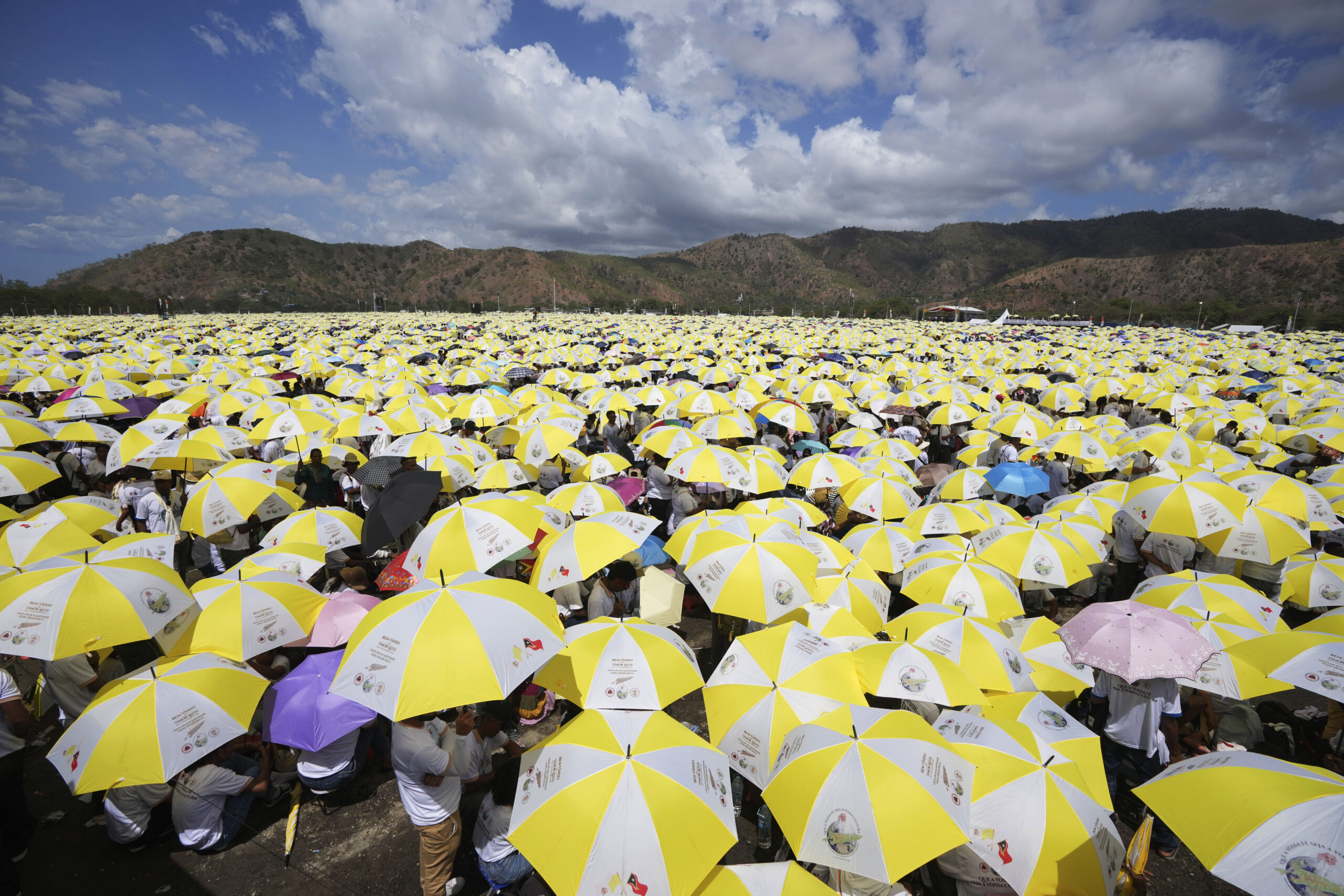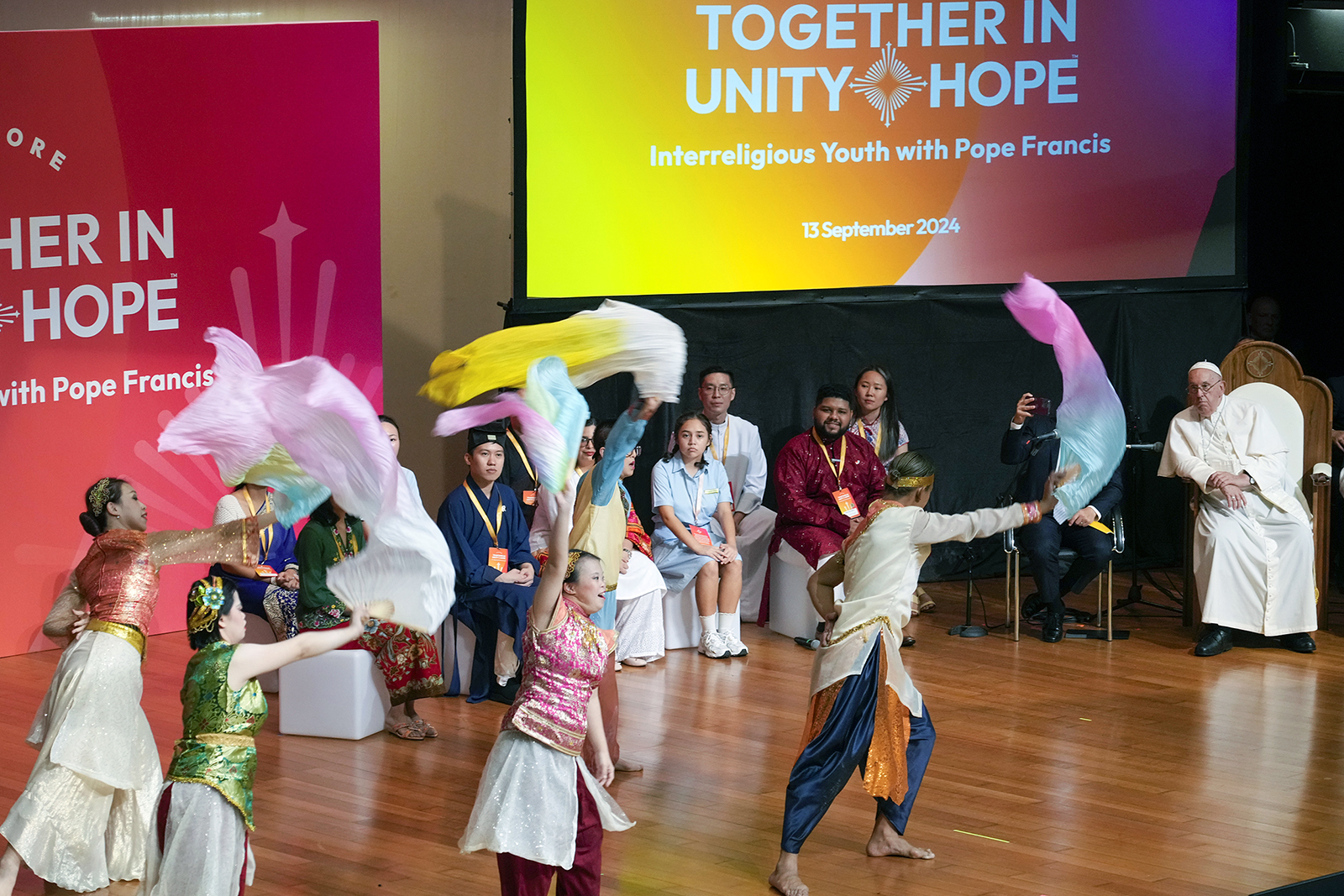(RNS) — The pope is back in Rome after his visits to Asia and Oceania. Here’s what we learned from his historic trip.
First, despite rumors to the contrary, Pope Francis is still up to the job. In just 11 days (Sept. 2-13), he visited four countries where the heat and humidity sap anyone’s strength, much less an 87-year-old’s. True, he spent much of his time in a wheelchair, but his mind remained sharp as he sat through friendly and substantive conversations with scores of ecclesial as well as political leaders.
The pope has another trip scheduled Sept. 26-29, this time to Belgium, followed by a monthlong synod in October. Clearly, this pope is not ready to step down.
Second, this pope is a superstar. Wherever Francis went, huge crowds flocked to see him. In Catholic East Timor, it is estimated half the country attended his Mass, but in every country where he took the stage, Catholic or not, the venue was filled to capacity and beyond.
RNS Vatican reporter Claire Giangrave reports that in Singapore, “a country where only 6.7% of the population identifies as Catholic, it came as a surprise that Francis could compete with international artists who performed at the same venue this year, including Coldplay, Ed Sheeran and Taylor Swift.”

East Timorese crowd Tasitolu Park for Pope Francis’ Mass in Dili, East Timor, Sept. 10, 2024. (AP Photo/Firdia Lisnawati)
Third, the pope brought a pastoral message of comfort and challenge to Catholics in Asia.
In most of Asia, Catholics are a small minority often subject to persecution. In Muslim-majority Indonesia, where Catholics are only about 3% of the population, the government officially tolerates all religions, but some areas nonetheless enforce Islamic law, known as Shariah. To be able to gather in large numbers to pray with the pope and celebrate the Eucharist allows these Catholics to feel the support of the worldwide church. It is a special blessing they will remember the rest of their lives.
As a pastor, the pope made a special effort to meet with children and the marginalized. These folks are always close to the pope’s heart. He enjoys meeting them more than with all the “important” people he has to meet during his visits.
But he does not come just to comfort; he also challenges Catholics to spread the gospel, the good news of God’s love for all people and our responsibility to care for one another.
In East Timor, he challenged young people to “not be deceived by consumerism and materialism and their promise of a comfortable and uncommitted life, which give the appearance of happiness but in reality are empty and illusory.” He invited them to “make the world a better place” where “justice and prosperity continue to spread for all people.”
Fourth, the pope brought a message of interreligious dialogue and cooperation.
Building on the interreligious groundwork of St. John Paul II, Francis is the apostle of interreligious understanding. He goes out of his way to meet with leaders of other faiths to foster trust and connection.
Dialogue is essential, Francis told Indonesian leaders, calling it “indispensable for meeting common challenges, including that of countering extremism and intolerance, which through the distortion of religion attempt to impose their views by using deception and violence.”
The pope especially wanted to go to Indonesia because it is the largest Muslim country in the world. He has met with leading Muslim clerics in Iraq, Egypt and elsewhere. He has signed documents with Sunni and Shiite leaders pledging to work together for peace, human development and to protect the planet.
In Indonesia, he met with Grand Imam Nasaruddin Umar at the famed Istiqlal Mosque, which is connected to the Catholic cathedral by a “Tunnel of Friendship.” They signed a joint declaration, “Fostering Religious Harmony for the Sake of Humanity,” calling for cooperation in the fight against dehumanization and climate change. The pope called for unity in the “defense of human dignity, the fight against poverty and the promotion of peace.”
He praised Indonesia and Singapore for their stress on harmony, peace and cooperation among believers of all faiths.
In Singapore he listened to young Christians, Hindus and Sikhs speak on a range of issues and told them: “All religions are a journey leading to God. They are, to make a comparison, like different languages, different idioms, to get there. But God is for everyone. And since God is God for everyone, we are all children of God.”

Pope Francis, right, attends an interreligious meeting with young people at the Catholic Junior College in Singapore, Sept. 13, 2024. Francis wrapped up his visit to Singapore by praising its tradition of interfaith harmony. (AP Photo/Gregorio Borgia)
Fifth, the pope joined his voice with residents of island nations suffering from climate change.
Parts of Jakarta are sinking into the sea. Pacific islands are threatened by sea level rise. Global warming will be devastating for the countries Francis visited. In East Timor, the pope met with environmental activists who have been inspired by his 2015 encyclical, “Laudato Si’.”
According Isaura Baptista Barros, writing at NCRonline, the pope “emphasized that true freedom is not merely the ability to act according to our desires, but rather the freedom to take responsibility. One of our core responsibilities is to care for our common home.”
But though climate change has been a major theme for Francis, Christopher White of the National Catholic Reporter pointed out that it was more often brought up by those he encountered than by the pope himself, showing that for Asians climate change is more urgent than for many in the West, and they see him as an ally.
Sixth, Francis never forgets the poor and marginalized.
He reminded government officials and rich Asians that they have a responsibility to make sure that the poor participate in the growing prosperity of the region.
In Singapore, one of the richest cities in the world, the pope told political leaders, “I would like to highlight the risk entailed in focusing solely on pragmatism or placing merit above all things, namely the unintended consequence of justifying the exclusion of those on the margins from benefiting from progress.” He called on them to give attention to the poor and the elderly.
Francis placed special emphasis on “protecting the dignity of migrant workers” who “contribute a great deal to society and should be guaranteed a fair wage.”
In several places on his tour, the pope visited poor and students being helped by Catholic programs.
In Papua New Guinea, where half the women report being raped, Francis advocated for the rights of women and their need for protection. He emphasized this point by visiting the Caritas Technical Secondary School, which educates girls and young women with disabilities.
Lastly, at the conclusion of his trip, Francis told Catholic voters in the United States to follow their consciences in the upcoming presidential election.
In response to a question at his news conference on the plane as he was returning to Rome, what the pope did not say was as important as what he did say. He did not tell Catholics whom to vote for. They are free to follow their consciences and vote for whom they think will be the best president.
Unlike their evangelical Christian counterparts, U.S. Catholic clergy traditionally talk about issues and values but do not endorse political candidates or parties. The pope kept to that tradition.
Like many Americans, he did not seem happy with either major-party candidate. He told Americans that they had to choose the lesser of two evils.
With regard to issues that Catholics should consider, he mentioned abortion and the treatment of migrants, although on both issues, the pope is going against the tide of American public opinion, which is pro-choice and anti-immigrant.
“Both (candidates) are against life, be it the one who kicks out migrants or the one who (supports) killing babies,” Francis said. “Both are against life.” He could have added other issues like global warming, health care, poverty and the wars in Gaza and Ukraine. All of these are issues about which the pope has expressed great concern, and they will be impacted by the November election.
It’s a message that fit with a trip that showed a pastor’s concern for the concrete problems of individuals and a world leader’s calls for all people to work for justice, peace and the protection of the planet.

